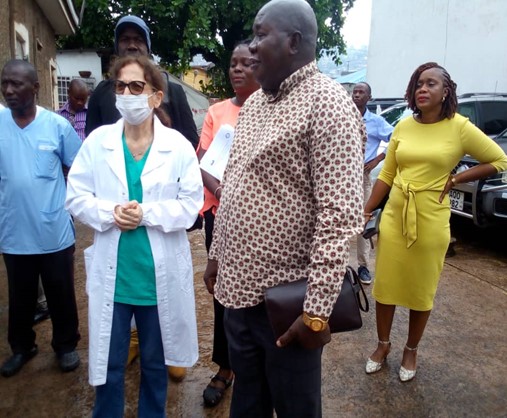As the rainy season approaches – Madam Cholera threatens Sierra Leone again
The word ‘Cholera’ became a fearful household name in Sierra Leone when in 2012 the disease dealt a terrible blow on this nation with disastrous consequences. Apparently, the disease has become one of those human induced epidemics this country has come to cope with, albeit with at the cost of human lives.
Indeed, more than ever before, the recent outbreak of the disease in 2012 in a poverty stricken country like ours attracted huge global attention to the extent that no less a person than the president of the country, Dr. Ernest Bai Koroma declared it an emergency.
It was the first time since this country started experiencing cholera that the international community had to step in robustly with millions of dollars to save lives, though the management of such funds became a subject of anti-corruption investigation.
Official figures of fatality were put at 300-500 throughout the country hitting all categories of persons – young and old, big and small, man, woman and child, etc. The sad part was that the Disaster Management Unit of the Office of National Security (ONS), the body that is charged with the duty to monitor and respond to natural or man made calamities as they occur, was unprepared for that kind of disaster. In fact, the unit does not have the capacity to deal with such as the magnitude of the 2012 cholera outbreak.
The major cause(s) of the disease was attributed to the filthy environment, poor sanitation and lack of access to pure drinking water, among others. Most affected were those living in slums or squalid conditions; even though it has been proven that people whose living standards were above average can be targeted by the disease if adequate precautions are not taken to clean their environment.
Usually, whenever the disease strikes Sierra Leone, it is mostly in coastal or fishing settlements like Yeliboya in the Kambia district or mining areas where access to good drinking water became a crisis and the casualty rate was almost always high among women and children.
Interestingly, the HIV/AIDS pandemic has often been declared a global threat to humanity, but the 2012 cholera outbreak in Sierra Leone where actual statistics of victims was a matter of guess, simply made the HIV/AID prevalence in Sierra Leone less alarming in proportion to the magnitude of the cholera outbreak last year.
Given this grim reality, Sierra Leoneans have not even noticed that the rainy season has started, the period when cholera and other cholera related diseases invade our communities. When one walks around the streets, particularly our capital Freetown and it environs, one cannot escape the ugly site of garbage, filth, and untreated drains, all excellent breeding grounds for all sorts of disease.
Today, in the 21st century, Sierra Leone is one country whose citizens continue to drink water from untreated boreholes and running streams. There are many communities in the western area and other rural communities where the inhabitants walk long distances to access safe drinking water. In other words, many Sierra Leoneans, for reasons beyond comprehension, do not have access pipe borne water. And with the lack of access to safe drinking water being one of the causative factors for cholera emergencies, efforts should be directed towards ensuring citizens have sustainable access to pure drinking water.
There has always been the problem of cleaning the filth in our cities. The local councils have been given that responsibility but they have never impressed the taxpayers. In the capital, Freetown, for instance, where last year’s cholera outbreak took a huge toll on its population, the picture has not changed a bit. The city is filthier than ever before and piles of garbage remain an eyesore, especially to visitors entering the city for their first time.
For us city dwellers, it is now a normal sight to see filth around us as we can sit by it and do our business or even eat our food on mounds of garbage without batting an eyelid. But it must be emphasized here that cholera is not a respecter of people who do not care about living in a decent environment or who do not pay attention to the kind of water they drink.
Now the rains are here; next to follow is our stranger, Madam Cholera. It is time to prepare for her so she doesn’t take us unawares as she did in 2012. This is especially for the authorities, our local councils, and the elders in our communities. The say make hay while it is yet sunny, however, a stitch in time saves nine!
Stay with Sierra Express Media, for your trusted place in news!
© 2013, https:. All rights reserved.






